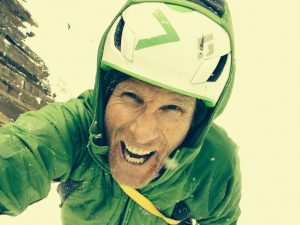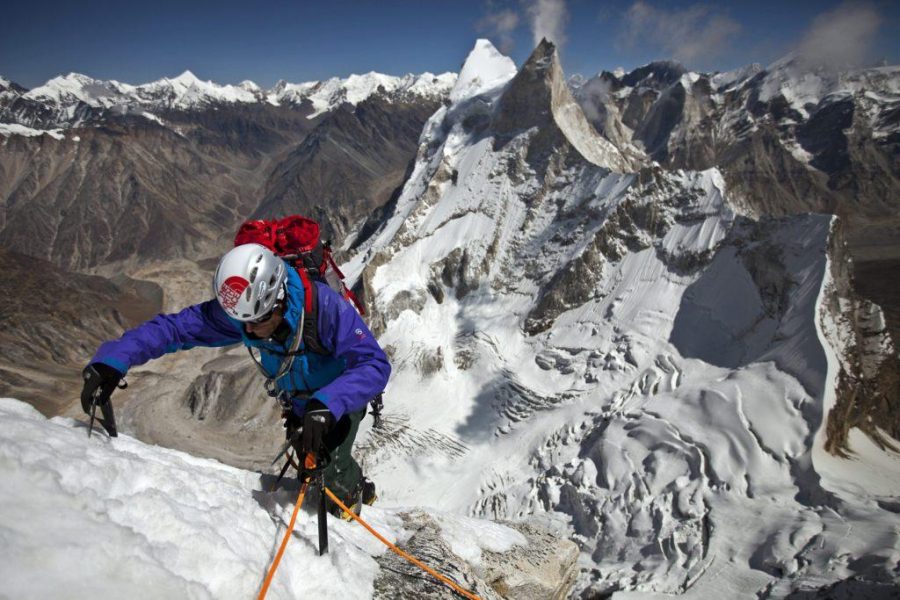I bustle in from my car exactly on time, jogging so I won’t be late. I hop-scotch my way through a snowbank onto the sidewalk and clutch my interview questions as I burst into the hotel lobby. There he is in a baseball cap and a flannel. Conrad Anker, climbing wonder. He is visiting Salt Lake City from his home in Bozeman, MT to deliver the keynote speech at Utah Clean Air’s (UCAIR) Inaugural Annual Report dinner. Anker smiles and waves from across the room as I walk his way. He draws himself up to his entire impressive height and shakes my hand, introducing himself as “Conrad.”
Conrad Anker, I would later learn, loves blueberries and the color turquoise. For the self-proclaimed “voracious reader” to pick a favorite book is to un-favorite all the others (but he still recommends Lao Tzu’s Cold Mountain book of parables to me). Also, he has a sweet-tooth. I start asking him how Conrad the University of Utah student became Conrad the Incredible Climber, and he chuckles. He knew since age 14 that climbing was the most important part of his life, making his decision to come to the U an easy one. “It had mountains on the brochure,” he says. He studied parks, recreation, and tourism to get himself every bit closer to climbing up peaks, cliffs, and ridges.
In college Conrad enjoyed his business case study classes. He took shifts living in a shantytown established in the Student Union to implore the university to divest from an apartheid-riddled South Africa. He was “kind of a nerd,” who liked his pens and science, and “basically an introvert.” Today, representing the North Face and speaking in front of massive crowds is vastly removed from where he wants to be — escaping into the mountains to climb. He surrounds himself with positive people, choosing simply to “let the pessimists go.”
When Conrad was in college, climbing wasn’t as simple as a trip to the Student Life Center Summit wall. It was an extension of backpacking and mountaineering—a means to revel in the outdoors. Still, he’s glad the U.S. now has 600 climbing gyms operating and 400 more in the works, because it means more people are exposed to the intrepid values of climbing that guide Conrad’s life. For him, the sport embodies kindness, positivity, and trust.

Conrad chooses to let traditional measures of success go. He worked as a carpenter after graduation not to bring in the bank rolls or get in front of a camera, but to have more time off for climbing. “My success is defined by my own internal compass, not by what society says,” Conrad says. Climbing isn’t just a sweet gig or a way to escape responsibility. For Conrad, it’s a means to be where he needs to be—outside. Conrad possesses a hyper-situational awareness that tugs his attention during our interview and leads him to feel cooped up just discussing an indoor engineering job. But during high-stress mountain expeditions, this hyper-focus is a necessity. It seems Conrad was made to be outside.
As for the high risk aspect of his feats, Conrad says his drive toward the life-threatening is written into his DNA. This isn’t to say he careens into impetuous adventure at every opportunity. He welcomes the opportunity to reevaluate his life and his trajectory, having done so most recently after surviving a heart attack 10 weeks prior to our meeting. When asked whether he can ever picture himself not climbing, Conrad replies, “Well I’ll always be climbing stairs.” He no longer feels the need to pursue ultra danger treks. Simple climbing and spending time in the mountains are what make him happy. This secure, easy awareness of purpose has brought Conrad through life and around the globe.
Photo courtesy of Jimmy Chin
Conrad Anker geared up and climbing near the team’s highest portaledge camp at over 20,000 ft.


